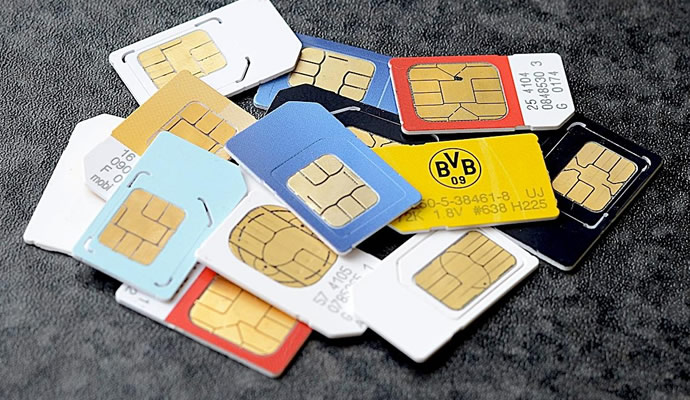Subscribers Kick Against Friday Deadline, Demand Extension
The National Association of Telecommunications Subscribers has urged the Nigerian Communications Commission to extend the deadline set for disconnecting telephone lines not linked to National Identification Numbers beyond Friday, March 29, 2024.
The subscribers’ body argued that telco agents were failing to capture all necessary information needed for verification, just as it also cited difficulties in uploading the captured data on the National Identity Management Commission’s server.
The President of NATCOMS, Adeolu Ogunbanjo, told The PUNCH on Wednesday that the NCC needed to order telcos not to disconnect telephone lines, considering the ongoing difficulties faced by subscribers.
The telecom regulator had insisted that there would be no changes to the deadline for the next phase of disconnection
The disconnection process was rolled out in stages, with the second phase scheduled for March 29, 2024, following the initial phase that occurred on February 28, 2024.
The third phase is slated to commence on April 15, 2024, as previously announced.
Earlier, the Director of Public Publicity at the NCC, Reuben Mouka, told The PUNCH, “We issued a publication that you can refer to. We specified certain deadlines and stipulated that subscribers who do not comply with the directive would be barred. And that has not changed.”
At the last deadline on February 28, 2024, about 40 million lines that were not linked to NIN were barred.
The NATCOM president said before the first deadline, subscribers had appealed to the NCC for a one-month extension.
However, the NCC explained that there was no issue as the process was designed to occur in phases.
According to the president, the Operator’s Consumer Centre stands as the primary location for consumers to complete their registration fully, with data provided there being verifiable.
However, the president noted that telecom agents were bypassing crucial information during the registration process, resulting in incomplete registrations of subscribers.
“For example, during interactions with telecom representatives, some agents fail to collect all required the information from subscribers.
“If a subscriber cannot provide certain details, agents often leave the registration incomplete. Consequently, these incomplete registrations are deemed unverifiable,” he said.
Further, Ogunbanjo noted that NIMC also shares responsibility in this process.
He said the challenges often arise when telecom companies attempt to upload collected data on NIMC’s server, owing to network issues.
“These network difficulties, beyond the control of subscribers, hinder the timely completion of the registration process,” he said.
“NIMC’s inadequate network infrastructure exacerbates the problem. While they intend to accept data uploads, technical issues prevent them from doing so effectively.
“We urge the NCC to address NIMC’s shortcomings, improve their services, and acknowledge that meeting the deadline will be challenging given the current issues,” the president added.
NIMC is a statutory Nigerian organisation that operates the country’s national identity management systems.
NIMC’s enrollment figures as of December 31, 2023, stand at over 104.16 million unique records.
About 530,345 Nigerians in Diaspora have gotten NINs. 59.12 million male and 45.04 million female Nigerians have NINs.
When The PUNCH reached out to NIMC for comments on technical glitches, the Head of Corporate Communications, Kayode Adegoke, clarifies that the commission’s server has consistently remained operational, debunking reports suggesting otherwise.
He emphasizes that the NIMC’s services are fully functional and accessible to all users
“Our server has never been down. You can go to the various NIN centres and confirm.
Adegoke further explained the process for subscribers to link their NIN to their SIM cards,
“These individuals only need to submit their NIN and complete the verification process through their respective telcos providers.
He encouraged those who have not yet obtained their NIN to visit any NIMC centre for enrollment.
Adegoke assured Nigerians that upon enrollment, individuals can expect their NIN to be available within three hours.
However, for those requiring corrections, such as rectifying date of birth errors, the process may take up to 72 hours.
Last week, the National Identity Management Commission and the NCC issued a joint statement unveiling a strategic partnership aimed at simplifying the NIN-SIM linkage procedures for telecommunications subscribers nationwide.
Both agencies reaffirmed their dedication to enhancing the processes involved and improving efficiency regarding the NIN and SIM card linkage initiative.
They acknowledge the importance of this initiative in bolstering security measures and enhancing service delivery across the country.
The SIM-NIN linkage initiative is a crucial step towards improving the integrity of subscriber data and enhancing security measures within the telecommunications industry.
The NIN-SIM linkage policy was initially introduced by the Nigerian government in December 2020. This directive requires all telephone line users in Nigeria to associate their SIM cards with their NIN.
In December of the previous year, the NCC issued a directive stipulating that all telecommunications operators in Nigeria, including major providers like MTN, Airtel, and Globacom, among others, must enforce complete network barring on all phone lines for which subscribers have not provided their NINs by February 28, 2024.
Barely two weeks ago, the Socio-Economic Rights and Accountability Project issued a warning to take legal action against the NCC if it does not revoke the directive instructing network providers to block the phone lines of individuals who have not linked their SIM cards to their NINs.


